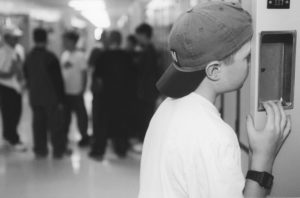Anger in his eyes
Years later, the scars from a bully’s blows remain, By Ryan Cleary
 I shall remember forever and will never forget
I shall remember forever and will never forget
Monday: my money was taken
Tuesday: names called.
Wednesday: my uniform torn
Thursday: my body pouring with blood
Friday: it’s ended
Saturday: freedom
The final diary pages of 13-year-old Vijah Singh. He was found hanging from the banister rail at home on Sunday.
— Neil Marr and Tim Field,
Bullycide, Death at Playtime: an Expose of Child Suicide Caused by Bullying, a study referenced in the bully, the bullied, and the bystander,
a book by Barbara Coloroso.
The woman in the following story asked that her family remain nameless.
Linda speaks for her son because he won’t have anything to do with an interview. As far as she knows, Jason never talks about “the incident” with anyone.
“He’ll leave the room if you bring it up,” she says, whispering, even though the house around her is empty.
Jason grew up in eastern Newfound-land with a “nice bunch of friends” who spent their summers playing soccer and baseball. Jason did well in school, particularly math, although Linda points out he wasn’t a teacher’s pet. During parent/teacher meetings, teachers described him with words like “kind and polite.”
“I remember laughing,” says Linda, who does so again.
“I said you’re not talking about my son are ya?”
She ends her laugh with a warm smile, lingering with a pleasant memory.
Jason never complained about being picked on or beaten up, she says. And he never was, until that day in junior high.
“It was report card day,” says Linda, sitting on the love seat. A telephone rests to her immediate left on the end table.
Jason left the school grounds over the lunch hour to buy an ice cream at a nearby store — breaking a rule his mother had set down to never leave the school property. “Jason thought I wouldn’t mind going to the store because he did well in his report card.”
In the parking lot outside the store, Jason, who was barely a teenager, was approached by another, smaller boy, a boy that he knew to see, but not more than that. The boy jeered Jason, eventually poking him with a fist.
Jason fought back, which is when the swarming began.
Jason’s hair was pulled and faced punched; his ribs kicked and hair pulled. His attackers numbered more than a dozen.Guys and girls alike were in on the beating. “It continued all the way back to school,” says Linda.
“The school called the house and said there had been ‘an incident’ at the store and Jason was being sent home. “It was no more than that.”
Jason was sitting in the living room when Linda saw him first. “He was soaked in blood.” Jason’s eyes were black, face red, and nose broken. There were also bruises all over his body.
Linda says her immediate reaction was to cry.
“I flipped out then,” she says, and telephoned the police, who promised to send a car by when they got a chance.
“You send someone over right now, I told them,” Linda says. “My son has been beaten.”
A complaint was made and charges laid. The court proceedings took months, during which Linda and her family were harassed in their home. Kids, who weren’t from the neighbourhood, would ring the door bell and take off running. When Linda opened the door she was called a “fat b—-,” among other names, and told to go back in the house.
It was Jason they wanted.
Linda’s husband kept a baseball bat in the closet by the front door, just in case. “I chased them once,” says Linda, “I had nothing on my feet and I chased them.”
Linda, her husband and Jason went to court a couple of times a week for months. Jason met for hours on end with police and prosecutors. He sat day after day in the witness box, pointing to the kids in the courtroom who assaulted him.
Linda says she watched another young man who was also assaulted throw up in the witness box. Linda says her son would turn “white as a ghost,” but he never buckled. That’s not to say the stress didn’t take a toll on Jason.
He had trouble going to bed at night — not so much with being alone in his room, but of falling asleep.
In the months following “the incident,” Jason grew a handful of inches. He was never picked on or beaten again (which Linda also attributes to his standing up for himself and the support of family and friends) but the assault had left its mark.
Linda talks about “the shame” Jason felt over not being able to defend himself, the hurt and fear that came with each blow delivered, and the embarrassment of being beaten in front of a crowd.
Years have passed since Jason was swarmed. He has grown into a fine young man. “Handsome and sweet,” his mother says.
But there have been changes.
Linda says she sometimes sees an anger in her son’s eyes, an anger that wasn’t there before he was beaten. “He gets loud,” she says. “It’s almost a rage.”
“Hello,” says Linda, picking up the phone next to her.
It’s Jason, calling from the post-secondary school he attends, looking for his father to pick him up.
“I’m here with a reporter,” Linda tells her son.
“We’re talking about the incident and how it affected you,” she says.
Mother and son talk for another minute before Linda hangs up the telephone.
“He doesn’t want to talk to you,” says Linda, apologizing for her son. “Maybe someday, but not now.”